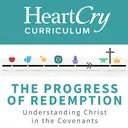00:00
00:01
Lesson 4 - Abraham Our Father Part 1
Series The Progress of Redemption
8,796 ( 8,468 | 328 )
The Progress of Redemption: A 12 part series on understanding Christ in the covenants. A teaching by HeartCry Missionary Society Coordinator, Hunter Gately. Every Friday.
| Sermon ID | 27221824305461 |
| Duration | 21:14 |
| Date | Feb 11, 2022 |
| Category | Teaching |
Add a Comment

